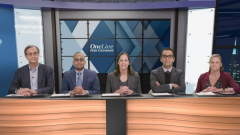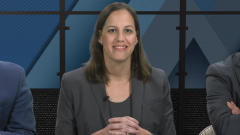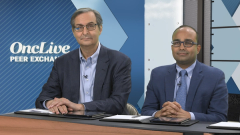
Other Combination Strategies in BRAF-Mutated Metastatic Colorectal Cancer
Before closing out their discussion on BRAF-mutated metastatic colorectal cancer, panelists consider other novel combination strategies in this setting.
Episodes in this series

Transcript:
Kristen K. Ciombor, MD: Even before the BREAKWATER study, we had the ANCHOR study. That was a bit interesting at that time, before we knew the doublet was as good or better than the triplet. It was already moving to the first-line setting, but without chemotherapy. Dr Hubbard, can you tell us a bit about ANCHOR and what that showed us?
Joleen M. Hubbard, MD: As you mentioned, this was a first-line setting for BRAF-mutated metastatic colorectal cancer using the triplet—the BRAF inhibitor, MEK inhibitor, and EGFR inhibitor—up front. I think to Dr Raghav’s point about what we were seeing in the initial BREAKWATER study, was it the effect of the chemotherapy or using it up front? I think it is some of the effect of the chemotherapy because in the ANCHOR study, the response rates were great, 47% or 48%, but not as great as when combined with chemotherapy. I think that’s telling us that chemotherapy is adding something to these patients beyond adding more BRAF-directed therapy. In terms of progression-free survival, about 6 months, and then overall survival of about 17 months, so pretty good for BRAF-mutated metastatic colorectal cancer [mCRC]. But I suspect that with BREAKWATER we’re going to see even better outcomes. The other thing too is, as you said, it was before we knew the doublet was as good as the triplet. I think we’ll probably be able to have less toxicity from the targeted therapies with the doublet BRAF-directed therapy, and then the known adverse effects of cytotoxic therapy, which we’re pretty good at dealing with now. I think the BREAKWATER regimen is going to be a better-tolerated regimen and has the potential to even improve outcomes beyond what we’ve seen with the ANCHOR study outcomes.
Kanwal P. Raghav, MD: I completely agree with you, Dr Hubbard. The 2 most interesting parts in the BREAKWATER study are the combination with chemotherapy and only the BRAF therapy because all those patients will get chemotherapy subsequently. So the question is if BRAF is the driver of that resistance to chemotherapy, and you’re treated withBRAF therapy first, can you overcome that? The question here is, is it truly an additive effect, or are we seeing true synergism? If we can see the overall survival benefit for either one of those strategies, then of course, the concept of what is more toxic and what is less toxic.
Joel R. Hecht, MD: I was thinking about this as you were talking about it because you need that period of time that you don’t get, so then that brings up the question of which chemotherapy to use for that. There was a fashion for a while about, while we’re using more and more modified FOLFIRINOX [folinic acid, fluorouracil, irinotecan, oxaliplatin] anyway, and we know we’re getting better and better at treating people, who may not be marathon runners at 40 years old. We’re getting much better at treating those patients. But there were some early data from similar regimens, like from the Italian data about BRAF, that hasn’t worked itself out. But it makes you wonder whether if the patient’s in good shape, back to what you just said, that you might want to try to get all 3 drugs to get as long of a progression-free survival as possible in someone who is going to fall off, so you can maybe do your reintroductions that you sent.
Kristen K. Ciombor, MD: I had mentioned a different triplet in BRAF, so ENCO [encorafenib], CETUX [cetuximab], nivolumab. Tell us a bit, Dr Raghav, about the rationale behind that and what the next steps are.
Kanwal P. Raghav, MD: This is a very interesting study. It was done by one of our colleagues, Van Morris, [MD]. The rationale behind this study, of course, we’ve already established that in second-line or subsequent therapies, anti-EGFR plus a BRAF combination [therapy] is effective. It’s just not where we want it to be. We know from preclinical models that whenever you expose colorectal cancer to targeted therapies, whether it is anti-EGFR or a combination of BRAF and anti-EGFR, it creates this kind of genomic instability, which creates an MSI [microsatellite instability]-high type of phenotype, a transient place where the tumors tend to have these mutations. We feel that is what could sensitize these cases to anti–PD-1 or immunotherapy. This was a single-center study, which fortunately because of its promising results, now is going into a cooperative group, national randomized trial wherein you treated all patients who were BRAF, EGFR, anti–PD-1 [therapy] naive. These were all MSI-stable patients, so not MSI-high because there are some patients with BRAF mutations who are MSI-high. In this case, we treated all of those patients with BRAF, anti-EGFR, and anti–PD-1, which was nivolumab.
The response rates in that single-arm study were about 45%, which is better than the 20% that you would’ve otherwise seen because this was more of a BEACON [trial] kind of setting. The median duration of response was close to 7 or 8 months, which is, again, better than what you saw with that regimen. Now of course, we have to prove this in a randomized trial, whether this is really working, or is the immunotherapy really adding something to this, and that’s where the next randomized phase comes into the picture. It’ll be interesting to see how these therapies and the combinations evolve over time.
Kristen K. Ciombor, MD: Our Japanese colleagues are presenting at ASCO GI [American Society of Clinical Oncology Gastrointestinal Cancers Symposium] tomorrow a trials in progress poster looking at the patients treated with encorafenib and cetuximab who then develop resistance, and then they add binimetinib to it and kind of rechallenge that. Because again, as we were talking about, some of the MAP kinase pathway upregulation as a mechanism of resistance, so maybe coming in and adding the MEK inhibition at that point. Maybe that will be a strategy we can employ too. I think we have a lot of questions to answer in terms of sequencing, in terms of combinations in BRAF, but at least we’re making some progress for our patients, which is the most important part.
Transcript edited for clarity.







































